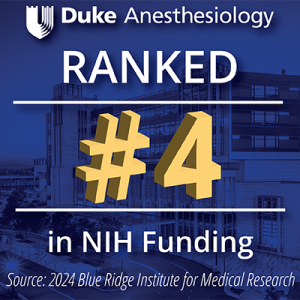NIH Grant Awarded to Advance Hypertension and Cognitive Decline Research
Congratulations to Niccolò Terrando, PhD, on receiving a five-year multi-PI $3,465,825 National Institutes of Health R01 grant to study the impact of hypertension and aging on postoperative delirium.
New E-Cigarette Products Contain Highly Potent Sweeteners
In a newly-published study in JAMA, Duke Anesthesiology’s Dr. Sven-Eric Jordt reveals a majority of disposable e-cigarettes tested by Duke researchers contain neotame, an unregulated artificial sweetener that enhances product appeal and raises toxicity concerns.
Propelling the Field of Anesthesia Forward
A new benchmark of 107 cutting-edge scientific abstracts was showcased at Duke Anesthesiology’s 33rd Annual Academic Evening, the department’s flagship event that aims to advance anesthesiology, critical care and pain management. Congratulations to the exceptional award winners spanning five categories of research.
Experimental Painkiller Could Outsmart Opioids – Without the High
New options for pain relief could be on the horizon with the development of a non-opioid pain reliever by researchers in Dr. Ru-Rong Ji’s Duke Anesthesiology lab.
NIH Grant Awarded to Explore Microbial Influence in Sepsis
Congratulations to Dr. Mara Serbanescu on receiving a $2,018,750 grant from the National Institutes of Health for her research that aims to reveal how alterations in gut bacteria and their byproducts that enter the bloodstream affect immune response and organ function during sepsis.
Duke Researchers Awarded NIH Grant to Study Neural Impact of Smoking Withdrawal on Pain
Congratulations to Duke Anesthesiology's Dr. Katherine Martucci on receiving a five-year $3,488,576 NIH R01 grant to study how smoking withdrawal alters pain processing in the brain and develop interventions for smoking cessation in chronic pain patients.
Dr. Achanta Awarded Grant for Novel Approach to ARDS
Congratulations to Satya Achanta, DVM, PhD, on being awarded a $199,962 grant to assess a novel intravascular membrane oxygen catheter, which may be beneficial for patients with acute respiratory distress syndrome (ARDS).
Duke Anesthesiology Solidifies Top-Tier Status in NIH Funding
The Blue Ridge Institute for Medical Research ranks Duke Anesthesiology the #4 anesthesiology clinical science department in the country for National Institutes of Health funding, solidifying our standing as a leading research institution within the field of anesthesiology.
Dr. Moon Awarded NAVSEA Grant to Advance Decompression Practice
Congratulations to Richard Moon, MD, on being awarded a five-year $1,991,019 grant from the US Navy for his study that focuses on reducing decompression risk following dives by utilizing an alternative breathing gas.
Artificial Sweeteners in Nicotine Pouches May Encourage Use, Study Finds
A newly-published study, led by Duke Anesthesiology’s Drs. Sairam Jabba and Sven-Eric Jordt, reveals hidden sweeteners in oral nicotine pouches mask the sting of nicotine but may entice first-time users and youth consumption.










